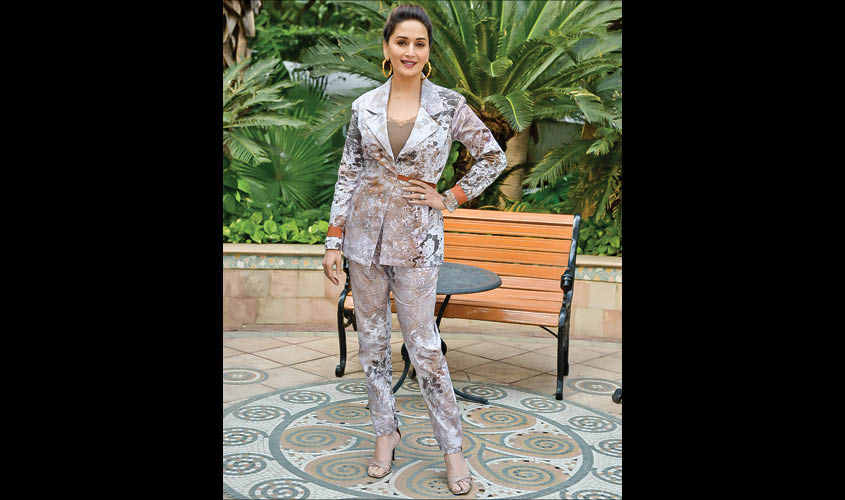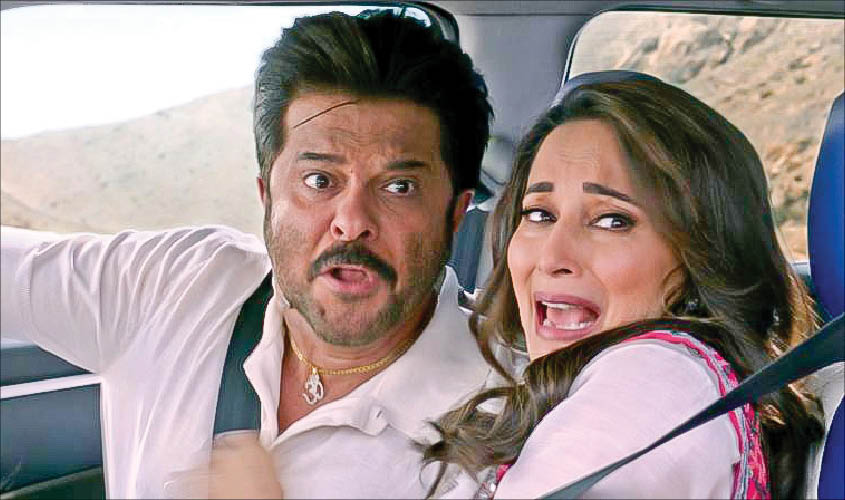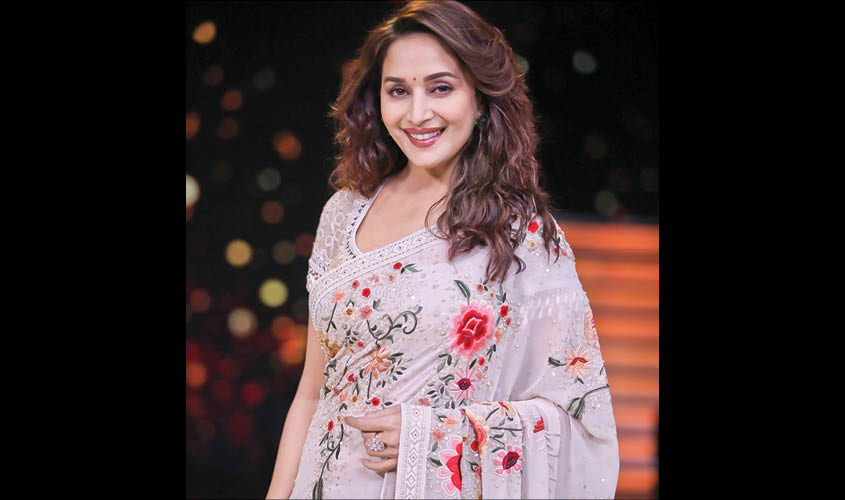Madhuri Dixit made her acting debut in 1984. What followed was a dream run of blockbuster hits, showbiz stardom and critical acclaim. Having spent over three decades in the industry, she is now branching out into production and singing, while also keeping her acting career going. She speaks to Bulbul Sharma.
Q. Your first hit film was Tezaab, which came four years after you made your acting debut. What kept you going as an actor during those early years of struggle?
A. I got good reviews from critics. They said, she has something in her. But back then I had no idea if I wanted to continue studies or take up acting. So I was sailing on two boats then. Luckily, I kept getting roles and film offers. After Abodh[her first film, released in 1984], I got Awara Baap [1985]. Meenakshi Seshadri was the main lead in that film and I was the second lead. I got that film and I had to shoot only for 10 days. I thought it would be good because with this short a schedule I could both study and act. Then I got another film, Swati [1986], and in that too Meenakshi was the main lead. This is how slowly and steadily I started getting film offers. Around the same time, Subhash Ji [Subhash Ghai] offered me a dance song in Karma[1986] and I said I would do it. After that he told me, “I want to introduce you in films, so stop doing these small roles.” He said that he wanted to introduce me through Ram Lakhan and I was signed for the film. But N. Chandra’s Tezaab [1988] released first, since Ram Lakhan was a multi-starrer and took time.
Q. Having completed 35 years in the industry, do you feel contented as an actor or do you have any regrets about the way your career panned out?
A. There are no regrets at all. Everything that I have done in my life was done because I wanted to do that. I am pretty much satisfied with the work I have done. Even at the start of my career I was fortunate to have got different kinds of films, and writers wrote different kinds of roles for me. Be it Tezaab, Ram Lakhan, Dil, Beta, Raja, Anjaam, Hum Aapke Hain Koun, Mrityudandand Dil To Pagal Hai—I got to play different roles at different points in my life.
Q. We always talk about the changes the Hindi film industry has undergone over time. But tell us about the things that have not changed in the industry since you made your debut in 1984.
A. I think only we haven’t changed, everything around has changed [laughs].
Q. A lot of women-centric films are being made these days. What do you think has led to this emergence of the female protagonist in Hindi cinema?
A. Back in the day,the Hindi film industry had great writers and directors, such as Guru Dutt and K. Asif. And they made many women-oriented films. Nutan Ji, Meena [Kumari] Ji and Madhubala Ji have done some very empowering roles. Then came an era when women just played the eye candy. But now the golden days in the Hindi film industry are back and women are getting powerful roles. It is happening because the kind of writers we have now are more evolved. Lovely roles are written for women and it is the best time for female actors.

Q. Many contemporary actors look up to you as their idol. How does that feel?
A. You have to work hard in any field. But apart from that you should get good opportunities. You have to work with good people. You are able to create an aura for yourself when you get the right directors, characters, songs and choreographers. It’s not just because of me that I have been able to create this aura, it is also because of the kind of work I have done. The kind of work you do also creates the image people have of you. And it’s wonderful when you get praised for it because you have worked hard for it. It feels that you have done something right.
Q. Who are your favourite actresses from the current lot?
A. Alia Bhatt is a very good actor. I like Deepika [Padukone], Priyanka [Chopra], Sonakshi [Sinha] and Kangana [Ranaut].
Q. In this age of content-driven cinema, there is little to no space for the kind of song-and-dance routines that films used to have when you started out in the 1980s. How do you feel about it?
A. People are never happy. But it also depends on what is your subject and what is the story about. What your film wants to say determines the kind of songs and dances it will have. When Betawas released, there was a requirement in every film for a romantic number. But things are changing now, because realistic movies are being made. If in such films the heroine starts dancing suddenly, it would look very off.
Q. Your latest film, Total Dhamaal,features you and Anil Kapoor together on the screen after 18 years. What apart from this reunion interested you in the film and made you sign the project five years after your last Hindi film, Gulaab Gang?
A. I heard the script first and I liked it a lot. My next question was “Who will play the lead opposite me?”He [Indra Kumar, director of Total Dhamaal] answered, “I have asked Anil [Kapoor] Ji.” I again asked him, “Are you sure he is doing it?” And Indu Ji answered, “Anil Ji also asked me the same question, if Madhuri is doing the film.” Then I and Anil Ji talked, and I said that it would be great if we could do the film together. I told him if you are doing it then I am doing it too. Having Anil Ji and me together lends a uniqueness to the characters, because we haven’t worked together for long and with Indu Ji [Indra Kumar] to top it all. Our last film with Indu Ji was Beta [1992]. So I thought this would be great. Our roles are also well-written and enjoyable. We play husband and wife, but we are not romancing. You will see us in a different light in the film, and the kinds of situations the characters are put in make the film even funnier.
Q. How has Indra Kumar changed as a filmmaker from Beta to Total Dhamaal?
A. He can handle any film and of any genre—be it comedy, tragedy, romance or any other. Betahad all shades. Raja also had all shades. In these films, the portions that were comic were great and the dramatic parts were amazing too. So he is good with all genres of films. His strengths, apart from comedy and other forms, is definitely dramatic movies.

Q. How has the comedy genre evolved in Hindi cinema over the years?
A. Comedy movies were made earlier in such a way that they had everything. They had romance, drama and action, along with comedy. They used to be an amalgamation of all the emotions. But now we are seeing out-and-out comedies. When Andaz Apna Apna[1994] came out, it was entirely a comedy film. It was such a nice film and it became a cult hit. However, it couldn’t do good business then and I was shocked. But now, out-and-out comedy films are more acceptable. It is also because our audience is open to a variety of content and are exposed to world cinema now. The audience is maturing and they want to watch a variety of films. I think this is why out-and-out comedy films are also working now. Also, people these days are in so much stress that they want to watch films like Golmaal, Dhamaal and Welcome. They want to de-stress in the theatre.
Q. You have replaced Sridevi in Abhishek Varman’sKalank. How was it like to take over a character that was originally supposed to be played by someone else?
A. As an actor it is a different thing. But as a person, it [Sridevi’s death] affected me a lot. She left so suddenly and it has left a void. It is difficult to accept. You realise that life is so short and you have no idea what may happen tomorrow. This is why I always say this: tell your near ones daily that you love them and hold them close.
Q. You also have an English pop album coming up. Tell us about that. And why not a Hindi music album?
A. I am more comfortable singing in English. I completed my studies from a convent school and we used to sing English songs there. So I decided that I will begin by singing in English and if it will be appreciated and accepted, I may attempt to sing in Hindi too.
Q. You have also produced a film for Netflix. How was that experience?
A. I have produced a Marathi movie. I didn’t produce it for Netflix, we had kept it open. I just wanted to make a good film. It was a wonderful journey to create something from scratch. I like the product that has come out. It is a sweet film, it is a comedy. There is a message delivered through the comedy, about personal freedom. It will be out on Netflix on 29 March.
Q. What do you think is the scope for regional content on digital platforms such as Netflix?
A. If it [the Marathi film she has produced] were to release in Maharashtra, there are few theatres that would have showed it. And then it would have gone to satellite TV and so on. But I thought if it comes to a platform like Netflix, it would go to 190 countries and the subtitling would also be done in so many different languages. So this movie will reach so many more people than it would have through theatres.

